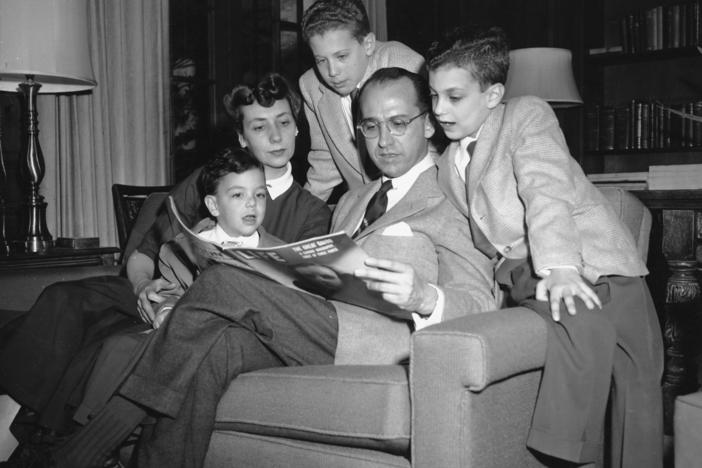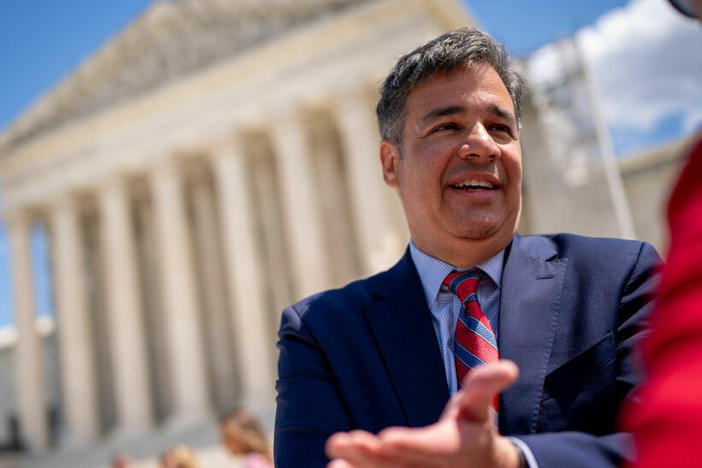Section Branding
Header Content
FDA authorizes Moderna and Johnson & Johnson boosters and 'mix and match' approach
Primary Content
The Food and Drug Administration has authorized booster shots for the Moderna and Johnson & Johnson COVID-19 vaccines. It's also allowing "mixing and matching" of vaccines as boosters.
Transcript
SARAH MCCAMMON, HOST:
The Food and Drug Administration has authorized booster shots for the Moderna and Johnson & Johnson COVID-19 vaccines and is now allowing people to choose to receive a different booster shot than the one they originally got.
NPR health reporter Pien Huang is here to tell us more about it. Hi, Pien.
PIEN HUANG, BYLINE: Hey, Sarah.
MCCAMMON: OK, so give us some context. What is the significance of today's decision?
HUANG: Well, with today's authorization, booster shots for all three COVID vaccines offered in the U.S. - that's Pfizer, Moderna and Johnson & Johnson - are now officially OK'd by the FDA. The goal is to provide more protection for people and communities against the delta variant. And the decision today basically follows recommendations last week from the FDA's Vaccine Advisory Committee. The Moderna booster is a half dose of the original vaccine at least six months after getting the original course, and it will be limited to people 65 and older, along with people who have health issues or living conditions that put them at higher risk for COVID. There was talk of getting that booster permission extended to all adults, but that decision didn't come from the FDA today.
MCCAMMON: OK, that's Moderna. What about Johnson & Johnson?
HUANG: Well, for the J&J vaccine, that additional shot will be for all recipients at least two months after getting their initial shot. So compared with Pfizer or Moderna, J&J has been less protective against severe COVID, and getting another shot could really boost that protection. So today they're recommending people either get a second dose of the J&J vaccine or a Pfizer or Moderna shot as a boost because today, the FDA also officially authorized using mix-or-match booster shots.
MCCAMMON: And what is the thinking behind this idea of mixing vaccines?
HUANG: So the thinking behind it and the reason that the FDA OK'd it is because some studies have shown that it might actually improve the immune response, especially for people who first got a J&J vaccine. Amanda Cohn, a CDC official who's also on the FDA's vaccine advisory committee, said this is a move that makes sense.
(SOUNDBITE OF ARCHIVED RECORDING)
AMANDA COHN: I think that, from a public health perspective, there's a clear need in some situations for individuals to receive a different vaccine.
HUANG: Now, it's not just for J&J recipients. People who got the Pfizer and Moderna vaccines will also be able to choose their own booster shot. There doesn't seem to be as much of a clear advantage there, but there also doesn't seem to be any harms. The FDA's mix-or-match allowance sets the stage for tomorrow, when the CDC's vaccine advisory committee meets. And they'll be setting clear guidelines for how these boosters should be used. Once CDC Director Rochelle Walensky approves it, people who qualify could start getting these booster shots.
MCCAMMON: In other big vaccine news, the White House also announced their plans today for giving out vaccines to kids. What will that look like?
HUANG: Yeah, so today, the White House said that they're operationally ready to roll out the Pfizer vaccine to children 5 to 11 once it's been OK'd by the FDA and the CDC. This is something that the agencies will be looking at closely over the next two weeks, so vaccines for kids wouldn't be available until the first or second week of November at the earliest. But Jeff Zients, the White House COVID response coordinator, says they're ready.
(SOUNDBITE OF ARCHIVED RECORDING)
JEFF ZIENTS: We will ensure that vaccinations for kids ages 5 through 11 are easy, convenient and accessible to every family.
HUANG: Zients said today that they've got enough supply to cover all 28 million kids in this age group in the U.S. They'll be able to get vaccines at doctor's offices, pharmacies, health centers, clinics and schools and hospitals. Some of those will be open on nights and weekends. Zients says that they're ready to set out the vaccine in lower doses with smaller needles for little arms as soon as the FDA and CDC say that they can.
MCCAMMON: All right, that's NPR health reporter Pien Huang. Thank you so much.
HUANG: Thanks for having me. Transcript provided by NPR, Copyright NPR.
Bottom Content



